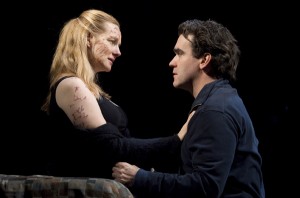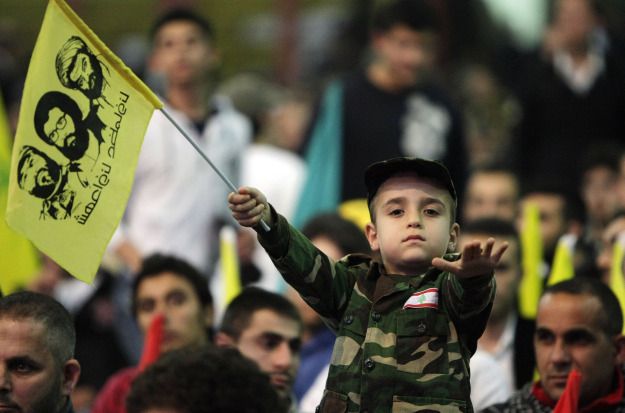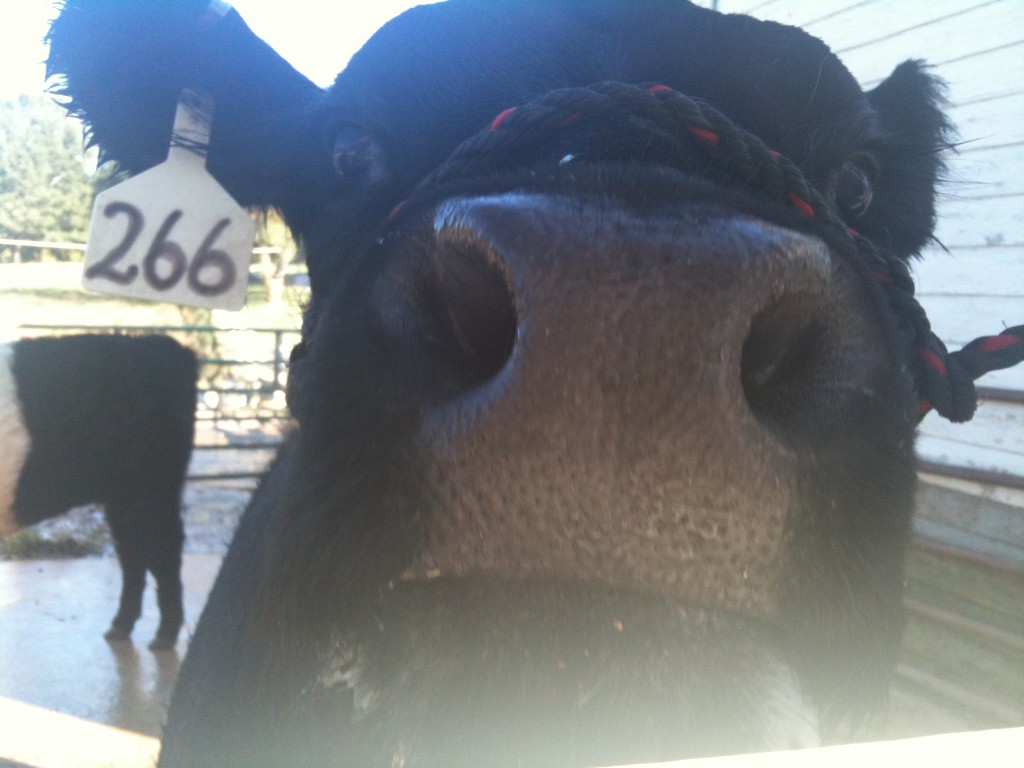WNYC’s Leonard Lopate
Today Leonard Lopate had me on his show, for a gracious, informed and detailed interview about Hezbollah, the current state of the Middle East, and A Privilege to Die. Lopate knows the subject well, and he pushed hard on Hezbollah’s relationship to Lebanon’s unique context. Audiences at book talks are often interested in questions like “What do they want from Israel?” or “Do they want to establish an Islamic state?” Much tougher to answer are the specific, granular questions: How does Hezbollah woo supporters, how does it exercise power, what will it do when its monopoly of force is challenged?
You can listen to the segment from The Leonard Lopate show here on the WNYC site.
Nasrallah and the Tribunal
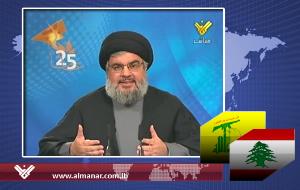 Sarah Lynch at Now Lebanon wrote up a Q&A about A Privilege to Die over the weekend. The freshest part of our conversation comes toward the end, when she asked about Hezbollah’s designs inside Lebanon. We talked about whether Hezbollah wants outright control over the whole country, and about how it might navigate its current dilemma between the role of resistance underdog and its reality as a well-armed, funded and politically-backed regional power.
Sarah Lynch at Now Lebanon wrote up a Q&A about A Privilege to Die over the weekend. The freshest part of our conversation comes toward the end, when she asked about Hezbollah’s designs inside Lebanon. We talked about whether Hezbollah wants outright control over the whole country, and about how it might navigate its current dilemma between the role of resistance underdog and its reality as a well-armed, funded and politically-backed regional power.
With indictments against Hezbollah pending from the international tribunal investigating Rafik Hariri’s murder, Hezbollah’s focus is on internal Lebanese politics as much as it is on the conflict with Israel. Nasrallah this evening dedicated another entire speech to the tribunal, which he paints as an Israeli tool. His theory is clearly aimed at Hezbollah’s constituency. He’s not trying to convince outsiders that Israel killed Hariri; he’s trying to galvanize Hezbollah supporters, who probably already hold Israel responsible for every assassination in Lebanon. Nasrallah is carefully laying the groundwork for a confrontation with Hezbollah’s Lebanese critics. (You can read Al Manar’s summary of the speech here.)
Hezbollah’s leader admitted that Israel had fully infiltrated Lebanon’s telecommunications infrastructure. He claimed that many Lebanese who had been suspected of spying for Israel, including Hezbollah members, were in fact compromised by Israeli-penetrated cell phones. Still, the thrust of Sunday night’s remarks was political and confrontational, like all Nasrallah’s previous speeches about the Tribunal and the likelihood for another conflict, internal or regional:
“There are some who believe that this indictment is an opportunity to get rid of Hezbollah, the enemy or the rival in Lebanon. We regard the indictment and its repercussions as a threat to Lebanon’s security; eventually this will affect our performance and conduct. …We have never been at this level of self confidence, power, ability, vigor, and domestic and regional presence. The indictment will not affect us.
I remind you of the year 1996, when all the tyrants of the world met in Sharm el-Sheikh to save Israel from the martyrdom operations of Hamas and the Islamic Jihad in occupied Jerusalem and Tel Aviv. They met and declared Hezbollah, Hamas, and the Islamic Jihad as terrorist organizations. They formed a panel of security ministers and intelligence chiefs who met in the US in a bid to find ways to crush these three organizations. They waged a tremendous psychological war, but they never met again. Israel used this international condemnation to attack Lebanon with the aim of destroying Hezbollah so that Shimon Peres would win another term as PM. What was the result? We chose to confront this psychological war and with the same spirit and determination we confronted Israel’s ‘Grapes of Wrath’ and the resistance won and Lebanon triumphed. Today I can tell those bargaining on the STL [Special Tribunal for Lebanon] being the introduction of a new Israeli war that the STL is not more grandiose than Sharm el-Sheikh, and back then we were as strong as we are today. No one can pressure us, not before the indictment and certainly not after it.
They say that time cannot run backwards, and I agree with them. The time when you were able to threaten us or target our existence and dignity is over.”
On Australian Radio
Listeners in Sydney, Australia today got to hear Mark Colvin’s of ABC’s PM program talk with me about Hezbollah’s likely reaction to indictments of its members in the Hariri assassination. You can, too, on their webcast, available here.
Paternity Leave
I will be posting less frequently over the next few weeks as I celebrate the birth of our daughter Athina Emeline Cambanis.
Larry Kaplow on Iraq
One of my favorite voices on Iraq is Larry Kaplow, the veteran reporter who to my knowledge spent more time in Baghdad than any other Western reporter. He has weighed in today with the kind of droll summation that is his trademark.
“It’s not over yet,” on Foreign Policy, describes the biggest fault lines splitting Iraq and threatening disaster as potently in the Mesopotamian war’s eighth year as it they did in its first. That’s right; Iraq’s quieter, but it’s still at war, as Larry reminds us in his “let’s cut the BS” fashion.
Larry is a tireless reporter and a good friend (we lived a few doors apart in the Hamra hotel for the couple of years I spent in Baghdad). At the height of the sectarian killing in Iraq, Larry liked to remind people that calling the conflict a civil war misleadingly implied that sectarian militias were fighting one another, when in fact, most of the violence entailed militias from one sect killing civilians from another.
Larry was well ensconced in Baghdad months before the American invasion began in March 2003, and he stayed, more or less without interruption, until the fall of 2009. He returned this summer and helped produce one of the most humane (and perversely enjoyable) accounts of what’s happened in Iraq for This American Life. The hour-long show is well worth streaming online or downloading to your iDevice.
On both Foreign Policy and This American Life, Larry is reminding us of the horrifying and still-uncalculated human toll of the Iraq war – and that despite the recent spells of quiet, he’s warning us that there’s still reason to fear.
If War Comes, Indeed
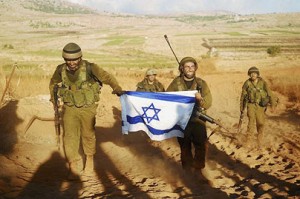 More than a month after skimming it, I have had the time to carefully read Jeffrey White’s paper on what a new war between Hezbollah and Israel might look like. “If War Comes: Israel vs. Hizballah and Its Allies,” a Washington Institute for Near East Policy publication, contains reams of useful information about the military tactics that parties to another Lebanon war might employ. However, White builds his argument on some misunderstandings and highly debatable assumptions about actors other than Israel. His analysis ignores much of the history of Israel’s last 30 years of war. And it fails to imagine any of the creative measures Hezbollah and its allies might take in another conflict.
More than a month after skimming it, I have had the time to carefully read Jeffrey White’s paper on what a new war between Hezbollah and Israel might look like. “If War Comes: Israel vs. Hizballah and Its Allies,” a Washington Institute for Near East Policy publication, contains reams of useful information about the military tactics that parties to another Lebanon war might employ. However, White builds his argument on some misunderstandings and highly debatable assumptions about actors other than Israel. His analysis ignores much of the history of Israel’s last 30 years of war. And it fails to imagine any of the creative measures Hezbollah and its allies might take in another conflict.
White’s main arguments are:
- Israel and Hezbollah both want a rematch from the inconclusive 2006 war.
- The next time around the stakes will be higher: both sides will fight for a decisive result.
- Hezbollah’s relationships with Syria and Iran make it more likely that a conflict will escalate into a regional conflagration.
- At its conclusion, White argues, a devastating Israel-Hezbollah war could create major new political crises, leave Israel occupying some of Lebanon and possibly all of Gaza, and destroy extensive civilian infrastructure – but he says it might also “break” Hezbollah military, weaken the Syrian regime, limit Iran’s influence, and weaken Hamas.
It’s definitely worth reading, and Andrew Exum posted his own very perceptive response to the paper on his blog. I want to amplify some similar questions and criticisms.
Fundamentally, White doesn’t account for the political reality of Lebanon today: Hezbollah has won the support of 1 million or more Lebanese, and achieved a statistical tie in the last elections. As a result, Hezbollah controls one-third of the government ministries, enjoys warm collegial relations with the president, the Lebanese Army, and much of the state’s institutions, and holds not only veto power but provides counsel to the weak government helmed by Saad Hariri.
Furthermore, Hezbollah has effectively silenced those forces in Lebanon that question Hezbollah’s right to manage its own militia, independent from the government’s army. Any attack by Israel on Lebanon – especially one that involveds widespread bombing of civilian infrastructure in particular in areas populated by Lebanese who oppose Hezbollah – will only renew Hezbollah’s legitimacy and expand its dominance over Lebanese politics.
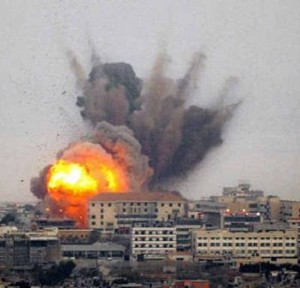 There is simply no outcome of a war that, as White imagines, could leave Hezbollah “broken as a military factor in Lebanon and weakened politically.” (To “break” Hezbollah would require Iran and Syria to end their partnerships with it.) Hezbollah’s military prowess depends on a few thousand fighters and relatively low-tech armaments that Iran and Syria can resupply at little cost. Hezbollah’s staying power stems from the web of influence it has built with its militia, its politicians, its network of social and educational institutions, and its increasingly potent ideology of Islamic Resistance.
There is simply no outcome of a war that, as White imagines, could leave Hezbollah “broken as a military factor in Lebanon and weakened politically.” (To “break” Hezbollah would require Iran and Syria to end their partnerships with it.) Hezbollah’s military prowess depends on a few thousand fighters and relatively low-tech armaments that Iran and Syria can resupply at little cost. Hezbollah’s staying power stems from the web of influence it has built with its militia, its politicians, its network of social and educational institutions, and its increasingly potent ideology of Islamic Resistance.
In passing, White invokes other assumptions that at best raise enormous questions and problems:
- He suggests that after another war Israel will occupy part of Lebanon and perhaps all of Gaza. Israel’s troubling experience doing so in the past led it to unilaterally withdraw from Lebanon in 2000 and Gaza in 2006. What does White think has changed to make occupation of these areas more sustainable or effective for Israel?
- In 2006, Israel thought that holding all of Lebanon accountable for the behavior of Hezbollah would weaken Hezbollah and strengthen its opponents. The opposite happened, and Hezbollah emerged stronger than ever before. Why would the same course of action by Israel this time produce different political results?
- The case for an expanded war depends on a calculus that Hamas, Syria and Iran might be drawn into a war, directly, if they believe Hezbollah is losing. An alternate interpretation suggests that none of those actors would have an incentive to directly involve themselves in an Israel-Lebanon war, especially if they believe that Hezbollah wins politically no matter what the outcome on the battlefield. (In my estimation, a Hezbollah that resists and survives to fight again wins politically even if its military forces are decimated.) The behavior of the “Axis of Resistance” parties in Operation Cast Lead (2008-2009), the 2006 Lebanon war, and previous crises, suggests they see no need for overt involvement in a time of hot war in order to cash in on the political benefits of being allies afterward.
- What of Israel’s cost in diplomatic support and strained relations if it engages in the kind of speedy and widespread campaign White describes? “War on this scale may come as a chock to some of Israel’s supporters, and to countries and organizations under the spell of ‘proportionality,’” he writes. Indeed, such a war could cost Israel vital support domestically, and in the United States, not to mention bringing it approbation and possible legal action supported by parties “under the spell of ‘proportionality,’” like the United Nations and the United States, whose military hews to that principle in its own laws of war.
- Iran and Syria gain from Hezbollah’s willingness to fight Israel, and its presumed survival of such a conflict. They have little to gain from a frontal military confrontation with Israel, and would likely be content to sit on the sidelines, frustrating any attempt to expand a war and fulfill the almost Polyanna-ish hopes to “reorder” regional politics, critically weaken all of Israel’s enemies in a single war, and “shatter” Hezbollah’s “myth of resistance and military power.”
There are lots of other questions worth asking, including whether analysts should take Israel’s war in Gaza as a fair preview of a conflict with a major opponent like Hezbollah.
Andrew Exum very graciously questioned White’s assumptions in his response to the paper at WINEP in September, and pointed out that the entire exercise seems to concentrate on the minutia of military tactics at the expense of examining the overall political and strategic context.
The analysis betrays a common Achilles Heel I’ve encountered while reporting on the Middle East – a real lack of familiarity with the governments, militant movements, and public sentiments in Arab states and in Iran. Many Hezbollah supporters I interview read Haaretz on line, study Hebrew, and read books like Ariel Sharon’s autobiography. They might not understand Israel and Israeli society, but they try, and their attempts at self-education have translated into adaptive tactics and strategy. Meanwhile, supporters of Israel all too often forget to question their own assumptions, make critical assessments of Israel’s enemies, or update those assessments as those enemies evolve. As a result, they can fall into analytical traps, misapprehending the motives of their opponents, their levels of public support, and the likely political consequences of applying military force to them.
If I understand White correctly, he’s arguing that next time Israel goes to war on its northern border, Israel should apply lethal, overwhelming, widespread military force to Lebanon, and it should be prepared to simultaneously do so to Gaza, Syria, and Iran. Such a venture, White argues, would probably leave Israel in a stronger position.
Reality, and the experience of Israel’s last wars, suggests the opposite. Widespread conflict would probably not leave Israel more secure, and would at the same time unleash manifold waves of unintended consequences. As the United States learned from its venture in Iraq, upending the card table doesn’t necessarily lead to better hands in the next game.
Jeffrey White hasn’t provided any compelling reasons why Israel would emerge in dramatically better condition than it is in today after a massive war against Lebanon, Syria, Gaza and Iran, and he certainly hasn’t provided any evidence (historical, comparative, analytical) that war in 2011 would play out differently than it did for Israel in 2009, 2006, 2000, 1996, 1993, and 1982.
He has, however, given us a glimpse of the kind of pie-in-the-sky assumptions needed to convince an American audience that a high-risk, expeditionary, regional war might yield great, unspecified consequences – without accounting for the chilling risks such a war carries for millions of Arabs, Israelis, and for U.S. interests in the Middle East.
Faith Middleton Show
Faith Middleton discussed Hezbollah with me on her show on Monday, broadcast on WNPR in Connecticut. You can listen to our conversation here.
Broadway Debut
Last week I had my Broadway premier at the Cort Theatre. I expect it might also be my last appearance on a stage there. Josh Yaffa, an editor at Foreign Affairs, invited me for a “talkback” after the play Time Stands Still. The story chronicles two journalists, a photographer and a writer, who return to New York scarred from covering the conflict in Iraq. The play deals with two interlocking matters — the demise of a relationship and the personal toll of a journalist’s work in the crucible of a war zone.
Two hours of emotional theater about how one couple navigated their relationship and their coverage of the Iraq war sparked a confessional half-hour conversation. Anne Barnard and I moved to Iraq together in 2004, a year into covering the story, and made our first home there. We closed down The Boston Globe Baghdad Bureau in 2006, nearly a year after we married. Our story thankfully doesn’t parallel that of the protagonists of Time Stands Still, but the pressures that warped and ravaged their psyches and relationship felt very familiar.
Josh asked a lot of smart questions of me and the three cast members who joined us on stage, Laura Linney, Brian D’Arcy James and Eric Bogosian. In response to an audience question about embedded journalism, Josh talked about his trip this summer to Chechnya, “embedded” with Human Rights Watch, and he observed that most conflict zone reporting depends on somebody’s help. The real measure of the work depends on how well the journalist contextualizes her work and on who’s hosting the embed.
I’m still unsure of one issue we discussed: can an individual find a healthy balance between war reporting and family life? I can’t generalize about others, but for me almost all work-life balance is cyclical rather than integrated — meaning I alternate periods of frenetic work (or long assignments away from home) with periods of immersion in my family and home. That whiplash is all the more extreme when the work period is in a war zone; and I haven’t covered combat since my son was born in 2008.
The other issue worth mentioning is the question of a reporter’s responsibility. In the play, Laura Linney’s character, the driven photographer, struggles with guilt because she intrudes on the private grief of others. A supporting character also questions the photographer’s role as a bystander, chastising her for passively documenting when she could be actively involved in helping others. Guilt and ambivalence are certainly natural reactions to war, which can dole out suffering indiscriminately, especially if one is a foreign journalist whose presence is voluntary. However, I don’t know of any case in the last decade’s wars where journalists could have helped innocent victims of conflict and instead chose to stand by out of a sense of professional ethics. I’ve seen war photographers in Bint Jbail set down their cameras to carry civilians to ambulances. I’ve seen Western journalists, as well as their Middle Eastern colleagues, give money and major logistical help to sources, passers-by and colleagues. So the binary sense that a journalist has to choose between documentary distance or empathic involvement seems somewhat false.
As for the sense of shame at intruding in the personal grief of others: it’s a very human and very instinctive reaction to chronicling the pain of others. As storytellers with a public platform, though, we’re well aware that we’re not doing our work solely for the subjects of or victims in our tales; at times, we’re not doing it for them at all. The act of bearing witness can be motivated by solidarity, but it is not a collective social act. Sometimes, in war journalism, we’re telling stories for our audiences. If the reason for doing so is sufficiently compelling, then the discomfort or even cruelty of gathering the story is worth it.
Dick Gregory, in his autobiography, recalls the scene at murdered civil rights activist Medgar Evers’ funeral:
The press was there that day, and I remember the way everybody gasped a little when a photographer from Life magazine almost stood on Medgar’s coffin to get a picture of Mrs. Evers. I gasped, too, but when I saw that picture, that beautiful picture of a single tear running down Mrs. Evers’ face, I knew that photographer could have stood inside that coffin and it would have been all right. (p. 190)
A different type of war, but the same questions.
You can listen to the discussion at the Time Stands Still talkback here; scroll down to the third talkback on October 26.
Hitchens on Hezbollah
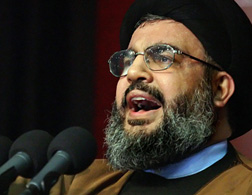 Christopher Hitchens on Slate laments Hezbollah’s renaissance in Lebanon. He blames two main factors: Israel’s “crass intervention in Lebanon in 2006,” and the United States unwilligness to take an interest in Lebanon. To his list I’d add a few other reasons: the absence of a coherent and compelling alternative to the “Axis of Resistance”; massive corruption and/or incompetence among so-called moderates; and the puzzling failure of non-militant movements to use religion to mobilize mass support.
Christopher Hitchens on Slate laments Hezbollah’s renaissance in Lebanon. He blames two main factors: Israel’s “crass intervention in Lebanon in 2006,” and the United States unwilligness to take an interest in Lebanon. To his list I’d add a few other reasons: the absence of a coherent and compelling alternative to the “Axis of Resistance”; massive corruption and/or incompetence among so-called moderates; and the puzzling failure of non-militant movements to use religion to mobilize mass support.
Very kindly, Hitchens also mentions A Privilege to Die:
A depressingly excellent book on the contours of that new reality is provided by Thanassis Cambanis. A Privilege To Die lays out the near-brilliant way in which Hezbollah manages to be both the party of the downtrodden and the puppet of two of the area’s most retrograde dictatorships. Visiting Beirut not long after Hezbollah had been exposed as an accomplice to Syria and as the party that had brought Israel’s devastating reprisals upon the innocent, I was impressed, despite myself, by the discipline and enthusiasm of one of Nasrallah’s rallies in the south of the city. Cambanis shows how the trick is pulled. With what you might call its “soft” power, the Party of God rebuilds the shattered slums, provides welfare and education, and recruits the children into its version of a Boy Scout movement, this time dedicated to martyrdom and revenge. With its “hard” power, it provides constant reminders of what can happen to anyone who looks askance at its achievements. Its savvy use of media provides a continual menu of thrilling racial and religious hatred against the Jews. And its front-line status on Israel’s northern frontier allows it to insult all “moderate” regimes as poltroons and castrati unwilling to sacrifice to restore Arab and Muslim honor. Many Sunni Arabs hate and detest Hezbollah, but none fail to fear and thus to respect it, which Nasrallah correctly regards as the main thing.
On “The World”
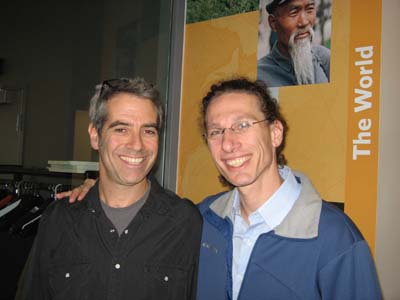 One of my favorite radio programs, The World (from WGBH, the BBC and PRI), had me on last Friday to talk about why people join Hezbollah and what the Party of God means to its million-plus followers. Marco Werman asked great questions, leading to a discussion of people in Hezbollah, and focusing again on Faris Jamil, who left Manhattan because of all the crime and drugs.
One of my favorite radio programs, The World (from WGBH, the BBC and PRI), had me on last Friday to talk about why people join Hezbollah and what the Party of God means to its million-plus followers. Marco Werman asked great questions, leading to a discussion of people in Hezbollah, and focusing again on Faris Jamil, who left Manhattan because of all the crime and drugs.
“I couldn’t raise my kids there!” Faris Jamil told me. Instead he moved to Aita al Shaab in south Lebanon, about a mile from Israeli border. Certain war seemed a small price to pay to raise his children in the cradle of the Islamic Resistance.
From an American perspective, it might not make sense why a successful businessman like Faris would prefer the cycles of destruction in southern Lebanon to the prosperity of New York. A big part of the explanation is also goes a long way toward explaining Hezbollah’s appeal: personal identity.
Hezbollah’s Boy Scouts
Where can you learn how to brush your teeth well, tie a knot, articulately recite a Hassan Nasrallah speech, and if you’re lucky, how to join the war against Israel? The answer is the Mahdi Scouts, Hezbollah’s contribution to the international scouting movement. Drawing liberally on Western scout movements as well as the Iranian revolution, Hezbollah has put together a dynamic movement that effectively instills its ideology and tactics in the very young. The Mahdi Scouts showcase Hezbollah’s dual approach — building community through religion and at the same time, mobilizing their devotees through an appeal to fight a unifying enemy.
This extract from A Privilege to Die published today in Foreign Policy describes the day I spent with a Mahdi Scout troop in Khiam.
Mohammed Dawi, the sweaty and plump scout leader, met us at the entrance to Khiam town. He was a redhead with freckles, and looked more Irish than Lebanese. The younger scouts were waiting in the basement of a high school a mile or so from the prison. The troop leader led them in a chant of welcome. Most of them wore blue shirts with epaulets, white scarves, and oversized badges featuring a photograph of a scowling Ayatollah Khomeini. Two boys who looked about ten wore full military fatigues.
It seemed the day’s activities had been planned with my visit in mind. The children marched downstairs single file and broke up by age group. The “buds,” six or seven years old, assembled for a puppet show, emceed by a man in a worn panda suit who sang lines from Nasrallah’s speeches. The “sprouts,” eight to ten years old, sat around tables at the rear of the room drawing pictures, their ideas inspired by a chubby and soft-spoken young woman named Malak Sweid. She was a graphic design student and zealous party apparatchik.
In “guided drawing,” the kids drew pictures of Israelis weeping in defeat, denoted by Stars of David on their helmets, or of Israelis stepping on Lebanese. Other children, with evident direction by Malak, depicted crosses and crescents, symbolizing the Lebanese Christians and Muslims, chained by vicious Stars of David. Other pictures spoke less to the conflict with the Jews than to Islamic values. One child’s picture showed women in low-cut gowns holding martini glasses and cigarettes in old-fashioned holders. “Smoking Harms Your Health” was the title.
The Best Audience
Last weekend I gave a talk at McIntyre’s Fine Books in Fearrington Village, near my hometown of Chapel Hill. Fearrington Village is known locally for its Belties, a characteristic species of striped cow. They made a fine audience when I described my encounters with Hezbollah. Later, after I ate shrimp and grits then took a meandering run through Fearrington’s retirement condos, the Belties were still there waiting, patient and bovine, by the bookshop. Very affirming, serene creatures.
The Enemy Becomes You
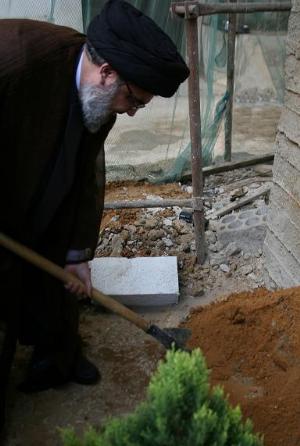 I’d wondered for a long time about Hezbollah’s tree-planting program. Once when I spent the day with a Mahdi Scout troop the boys planted a bank of cypress trees as a windbreak by a Khiam playground, but I hadn’t encountered a lot of arboreal work.
I’d wondered for a long time about Hezbollah’s tree-planting program. Once when I spent the day with a Mahdi Scout troop the boys planted a bank of cypress trees as a windbreak by a Khiam playground, but I hadn’t encountered a lot of arboreal work.
In fact Hezbollah plants trees big time; Hassan Nasrallah appeared in public on Saturday for the first time in years to plant what the party claimed was its millionth sapling in the Dahieh, Beirut’s southern suburb. When it comes to symbolism (and institution-building), Hezbollah has openly borrowed from Israel and the early Zionist movement. Tree-planting and reforestation have been tremendously effective in Israel, both from a practical standpoint and as a way of cultivating popular attachment for the land. No simple is more apt (or as compelling, perhaps) as a little sapling taking root, firming up, and growing into a tree. It seemed like a no-brainer that Hezbollah would incorporate tree-planting into its tactical canon.
I first noticed the story reported by Alistair Lyon of Reuters, then quickly found links to the report on Hezbollah’s Al-Manar website, which broadcast the planting near Nasrallah’s house.
Jihad al Binaa, or the Holy Struggle for Reconstruction, spearheaded the urban tree-planting campaign over the last few months, Nasrallah said on Al-Manar:
“We wanted to plant this tree in this particular place, near our residence in Haret Heriek, which was destroyed during the 2006 war, to address every citizen and say: If every Lebanese plants a tree next to his house and pledged to take care and preserve it, imagine how our country would look like.”
Indeed. Lebanon could use more trees, and the congested confines of the unplanned, overcrowded Dahieh in particular could use anything to improve quality of life.
Privilege to Die in Boston this weekend
My first appearance in Boston is coming up this Saturday as part of the Boston Book Fair. Noah Feldman from Harvard Law is moderating a panel called “Global Hot Spot: the Middle East’ featuring Nir Rosen, Haleh Esfandiari, and me.
I hope to see all my Boston-area friends at noon on Saturday at the Trinity Church Forum, 206 Clarendon Street, Boston.
The Human Face of Hezbollah
![]() David Shribman reviewed A Privilege to Die in today’s Boston Globe. It’s an honor to be reviewed by such a heavyweight (David won a Pulitzer for his Washington reporting at the Globe, and now edits the Pittsburgh Post-Gazette; I don’t know him personally.)
David Shribman reviewed A Privilege to Die in today’s Boston Globe. It’s an honor to be reviewed by such a heavyweight (David won a Pulitzer for his Washington reporting at the Globe, and now edits the Pittsburgh Post-Gazette; I don’t know him personally.)
From the review:
Where some writers talk about the Arab streets, Cambanis has walked them. Along the way he encountered warriors and hospital workers, polished intellectuals and women who sell nuts by the curb, ideologues and theologians, those who engage in small acts of resistance and those who prosecute total war of the most brutal sort. …
What becomes clear is that the key to Hezbollah is its ability to spread virtue along with the violence. It promises, for example, to restore communities — homes and businesses — to their original conditions after each episode of conflict. “Hezbollah needed to keep [its] soft supporters happy,’’ Cambanis writes, “and to do so it needed to deliver bricks and mortar along with its ideology.’’
On The State of Things
As I’d hoped, my mother thought my talks in Chapel Hill and Fearrington Village were excellent. She found me very articulate. There were some other, perhaps more unexpected, surprises on the homecoming leg of my book tour. My sixth-grade teacher, Mr. Greenlund, led an intimidating phalanx of educators from my past (among them Ms. Brooks; Mr. Baldwin; Profs. Kramer, Gingher, and Betts).
And I got to go on what for me is the original public radio station: WUNC. You can hear the segment with The State of Things host Frank Stasio here. (Thanks, Amber!) North Carolina provided the perfect venue to explore the remarkable tactical parallels between Hezbollah’s approach to social organization and the rise of evangelical mega-churches. I don’t mean to stretch the comparison too far, but my encounters with evangelical movements in North Carolina showed me an early, effective model that paired social activities with religious educations, proselytizing with community service, and faith with political activism.
The Way Hezbollah Lives Now
 CBC Radio’s Dispatches program did a nice long interview with me earlier this week, focusing on the nuts-and-bolts of Hezbollah’s approach to individual constituents. We talked at length about Faris Jamil, the Hezbollah supporter who once worked in Manhattan for a Jewish fabric merchant but decided to move his children to Aita al Shaab and raise them in the Islamic resistance.
CBC Radio’s Dispatches program did a nice long interview with me earlier this week, focusing on the nuts-and-bolts of Hezbollah’s approach to individual constituents. We talked at length about Faris Jamil, the Hezbollah supporter who once worked in Manhattan for a Jewish fabric merchant but decided to move his children to Aita al Shaab and raise them in the Islamic resistance.
You can listen to the conversation with Rick MacInnes-Rae on this link. Scroll down to the segment entitled “The gospel according to Hezbollah.”
The Next War
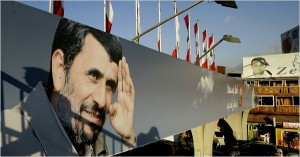 How eager is Hezbollah for another conflict with Israel? On my last trip to Lebanon in September, I found both Hezbollah’s officials and the party’s rank and file feeling ready — bristling for a rematch, confident if not precisely eager. Hezbollah officials said they had doubled their fighting ranks (one said the number had tripled) since 2006. Supporters living in the border regions, like Aita al Shaab, said they had finally fully recovered from the last war and felt ready to fight again.
How eager is Hezbollah for another conflict with Israel? On my last trip to Lebanon in September, I found both Hezbollah’s officials and the party’s rank and file feeling ready — bristling for a rematch, confident if not precisely eager. Hezbollah officials said they had doubled their fighting ranks (one said the number had tripled) since 2006. Supporters living in the border regions, like Aita al Shaab, said they had finally fully recovered from the last war and felt ready to fight again.
Hezbollah supporters who time and again have lost their homes and livelihoods seem to embrace continued confrontation. What’s more, based on what they told me, they believe they’ll emerge at least as strong — politically and strategically — from another war as they did in 2006, even though nearly all of the people I interviewed thought the next conflict would be apocalyptic in its ferocity.
Lebanon has become even more polarized than it was in the years immediately after the 2006 war. Then the split worsened between those who support Hezbollah’s approach to Islamic Resistance and those who espouse a less confrontational course (and hold a majority in the government). There used to be a substantial pool of Lebanese in the middle; they wanted non-sectarian, non-confrontational politics for their country but who also sympathized with Hezbollah’s resistance project. By now, though, it seems that the soft middle has largely vanished. Most of the people I talked to were quite emphatic, either in their absolute loyalty to Hezbollah or in their absolute conviction that Hezbollah was ruining Lebanon.
I wrote about Hezbollah’s view of the coming conflict in today’s Times.
AITA AL SHAAB, Lebanon — It was from this shrub-ringed border town that Hezbollah instigated its war withIsrael in 2006, and supporters of the militant Shiite movement sound almost disappointed that they have not fought since.
“I was expecting the war this summer,” said Faris Jamil, a municipal official and small-business owner. “It’s late.” He has yet to finish rebuilding his three-story house, destroyed by an Israeli bomb that year.
In 2006, Hezbollah guerrillas crossed the border a few hundred yards from the town center, ambushed an Israeli patrol and retreated through Aita al Shaab with the bodies of two Israeli soldiers.
Hezbollah officials and supporters said they were now sending a pointed message to Israel through their efforts to rebuild, repopulate and rearm the south.
“We are not sleeping,” said Ali Fayyad, a Hezbollah official and member of Parliament. “We are working.” He receives visitors every weekend in a family home in Taibe, the site of a deadly tank battle in 2006.
Four years later, Hezbollah appears to be, if not bristling for a fight with Israel, then coolly prepared for one. It seems to be calculating either that an aggressive military posture might deter another war, as its own officials and Lebanese analysts say, or that a conflict, should it come, would on balance fortify its domestic political standing.
Pointless peace process?
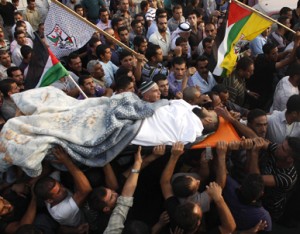 Writing today in The Daily Beast, I ask why Washington appears to invest so much hope in the latest direct talks between Israel and the Palestinian Authority. People I talked to in the Middle East as these talks were getting underway were almost universally resigned in advance to failure on this round.
Writing today in The Daily Beast, I ask why Washington appears to invest so much hope in the latest direct talks between Israel and the Palestinian Authority. People I talked to in the Middle East as these talks were getting underway were almost universally resigned in advance to failure on this round.
Two suggestions diplomats and observers in the region made: bring actors like Hamas and the Israeli opposition into the talks, and change the structural incentives for Israel and Palestinian parties, which currently reward the status quo.
Not a single person I interviewed in the Middle East during the last two months expected anything to come of the current talks—certainly not anything good—although, for the record, no one predicted either that a failed peace process would unleash a new intifada or wholesale change in Israeli priorities.
Instead, the Arab diplomats, analysts, and activists who support Hamas and Hezbollah with whom I spoke seemed in accord that for the time being, neither the Israelis nor the Palestinians saw anything to gain from dialogue, except for earning chits with Washington.
The main benefit of a peace process, in this view, is that Washington wants one, and so long as it doesn’t cost anything, Washington’s allies in Ramallah and Jerusalem are happy to oblige.
